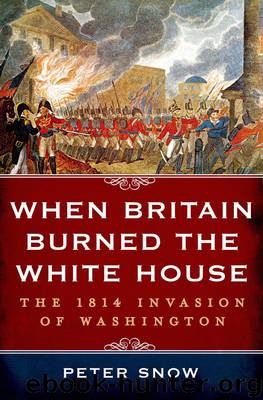When Britain Burned the White House by Peter Snow

Author:Peter Snow
Language: eng
Format: epub
ISBN: 9781466848948
Publisher: Thomas Dunne Books
14
A tempest of dissatisfaction
28–29 August
BY THE MORNING of 29 August Captain James Alexander Gordon was ready. His ships were at anchor on the seafront of Alexandria. He wrote down his terms for the town’s surrender and had the document delivered to the town council. The deal would guarantee their lives and homes but it would cost them dear. All military stores should be handed over. All vessels and all merchandise ‘must be delivered up’ and ‘possession will be immediately taken of all the shipping’. Gordon even insisted that a number of ships, which had been sunk in the harbour to avoid capture, should be refloated and reloaded with their cargoes. Gordon’s final demand was that refreshments should be delivered to his ships; these would be ‘paid for at the market price by bills on the British government’. It had long been a custom, rigorously enforced by Wellington in the Peninsula, that food supplies raised from local people should be paid for. It was a fine principle, sometimes ignored: Gordon was going to insist that his men respected it on this occasion.
It didn’t take the town council long to agree to the terms – with one or two minor concessions that they persuaded Gordon to accept. The British promptly spent three days raising the sunken ships, and loading them and many others – twenty-one ships in all – with a massive cargo of booty. They amassed around 1,000 hogsheads of tobacco, some 15,000 barrels of flour, together with scores of bales of cotton, stocks of wine and other useful stores. Alexandria’s merchants stood mournfully watching their warehouses being emptied. The British sailors made a thorough job of it, but they cast an occasional glance over their shoulders in case they were attacked.
Alexandria’s leaders came in for scathing censure afterwards for surrendering to the British. They said the criticism was ‘cruel and unfounded’. A group of indignant citizens of the town wrote a public letter to both houses of Congress: ‘What alternative had we to tell the enemy we could not resist, because we had not the means? We yielded to superior power. Our weakness has been no crime. Our reliance upon the protection of our government has been our misfortune.’ The Mayor himself wrote a revealing letter to his wife, Nancy, on 3 September expressing his admiration for the way the British navy had conducted itself. ‘It is impossible that men could behave better than the British behaved while the town was in their power. Not a single inhabitant was insulted or injured by them in their person or houses.’ Charles Simms even went on to deplore the ‘outrage’ committed against a lone British midshipman who was assaulted by three American naval officers on the quayside. He was seized by his neck scarf and was being dragged away struggling when, luckily for him, the neck scarf came undone and he escaped. Simms found himself having to explain to a furious British captain that the townspeople had had nothing to do with the attack and ought not to be held responsible for it.
Download
This site does not store any files on its server. We only index and link to content provided by other sites. Please contact the content providers to delete copyright contents if any and email us, we'll remove relevant links or contents immediately.
| African Americans | Civil War |
| Colonial Period | Immigrants |
| Revolution & Founding | State & Local |
Cat's cradle by Kurt Vonnegut(15351)
Pimp by Iceberg Slim(14506)
4 3 2 1: A Novel by Paul Auster(12391)
Underground: A Human History of the Worlds Beneath Our Feet by Will Hunt(12097)
The Radium Girls by Kate Moore(12026)
Wiseguy by Nicholas Pileggi(5782)
The Fire Next Time by James Baldwin(5441)
Perfect Rhythm by Jae(5402)
American History Stories, Volume III (Yesterday's Classics) by Pratt Mara L(5307)
Paper Towns by Green John(5188)
Pale Blue Dot by Carl Sagan(5007)
A Higher Loyalty: Truth, Lies, and Leadership by James Comey(4959)
The Mayflower and the Pilgrims' New World by Nathaniel Philbrick(4502)
The Doomsday Machine by Daniel Ellsberg(4489)
Killers of the Flower Moon: The Osage Murders and the Birth of the FBI by David Grann(4447)
The Sympathizer by Viet Thanh Nguyen(4390)
Too Much and Not the Mood by Durga Chew-Bose(4345)
The Borden Murders by Sarah Miller(4324)
Sticky Fingers by Joe Hagan(4197)
